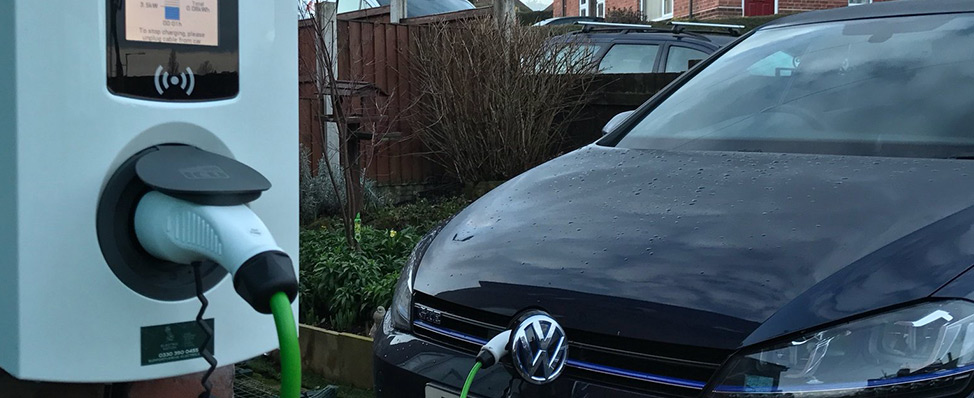When you buy an Electric Vehicle (EV) you may be offered the option of having a home chargepoint installed as well.
Many plug-in car manufacturers have deals or partnerships with chargepoint suppliers, and in some cases provide a free home chargepoint as part of a new car purchase, but it’s worth checking if it’s the sort of EV chargepoint you want.
Charging an EV is a simple process that requires you to connect it to a source of electricity via a cable. Chargepoints come with different operational features, charge rates, sockets, and cables may come tethered or otherwise.
Additionally a qualified electrician will need to consider a few key issues to determine whether you can have an EV chargepoint installed at your home: whether you have somewhere suitable to locate the chargepoint and your EV while it’s charging; whether it is safe to add an EV to the demands on your electricity supply; and whether you need permission to install it, though it is your responsibility to obtain the necessary permissions.
Some units can have additional features such as charge scheduling, meaning they can be set to charge the EV overnight and/or at times of off peak electricity tariffs like Economy 7. And they can be monitored remotely, allowing you to check on it, to change settings or to switch charging on or off without being present. This is known as ‘smart’ charging.
What do chargepoints cost?
The Energy Saving Trust suggests the typical cost for a home chargepoint and installation is approximately £1,000. But that is only a very rough guide: the cost of installing a chargepoint depends very much on the individual situation. The price of the equipment can also vary depending on its specification.
In Scotland, Energy Saving Trust provides up to £300 towards a chargepoint in some situations, for more information visit here.
OZEV offers the Chargepoint Grant to landlords, limited to £350 per grant. For more see here.
Charging from solar PV
If you have solar PV installed, it makes sense to use the electricity it generates to charge your EV either directly by charging during daylight hours or via storing the renewable energy in a battery during the day and using the stored energy to charge the EV in the evening.
If you are planning to use solar PV to charge your car be sure to select an EV chargepoint solution that enables effective solar charging.
Finding an installer
If you’re looking to install an EV chargepoint at your home, we recommend you use an EVCC member. In doing so you can:
- Ensure you receive high standards of service from the installer you choose, including one who is technically competent and has the necessary qualifications
- Ensure the contract you sign with the installer is legally fair and you have the necessary protections in place
- Ensure you have access to REAL’s dispute resolution service, including free mediation and a low-cost independent arbitration service, should something go wrong
- Ensure your contract is fulfilled in a timely and efficient manner
- Gives you access to free guidance and expert advice through EVCC.
- To get the prementioned grants, companies will need to be OZEV approved and approved by EST Scotland.
You can find an EVCC member here.
Further guidance
For more on EVs and EV chargepoints, REAL has produced consumer guidance. The guidance lists the questions you should ask your installer before deciding to go ahead and answers such questions as how long does it take to charge an EV and how much does it cost to charge an EV. This guidance can be found here.
Government
Government has agreed to roll out EVs in a bid to reduce CO2 emissions from the transport system and to reduce air pollution. The strategy is predicated on a number of core documents. These are described briefly here.
